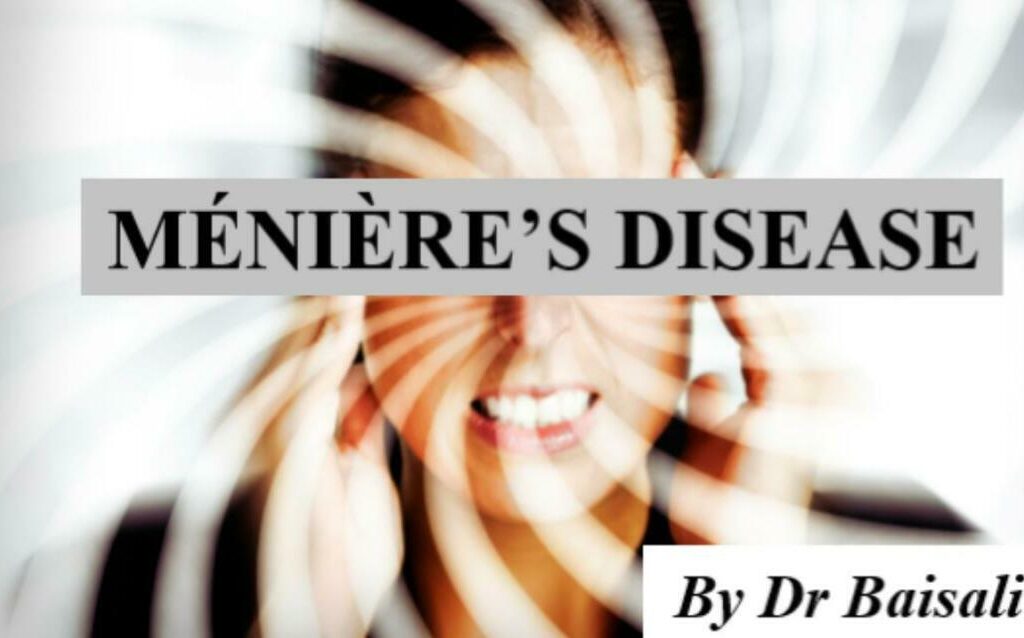Meniere is a condition characterized by sudden spontaneous episodes of vertigo, nausea, vomiting and fluctuating hearing loss.

Pathology
- Overproduction or malabsorption of endolymph, results in endolymphatic hypertension. The endolymphatic hypertension further results in gross enlargement of membranous labyrinth called endolymphatic hydrops.
- Vascular insufficiency may play a role in endolymphatic dysfunction.
Clinical features
- Hearing Loss: It has 3 Phases.
- Early reversible hearing loss.
- Established Fluctuating hearing loss.
- Late non-fluctuating hearing loss.
- Vagal Stimulation may occur. Patient complains of sweating and pallor. This is seen is acute attacks.
- Recurrent attacks of spontaneous vertigo. Intensity of vertigo increases over a period of minutes and then usually lasts for several hours (20 minutes to 24 hours).
- Tinnitus: It is variable, low pitched, roaring in nature and prominent before an attack. Tinnitus is unilateral and subjective.
- Sensation of heaviness and fullness in the ear.
- Severe anxiety.
- Nystagmus is always present during an attack.
Diagnosis
According to American Academy of Otolaryngology – Head and Neck Surgery, Meniere’s disease is diagnosed as Definite, probable or possible Meniere’s disease.
- Possible Meniere’s disease-·
- Episodic vertigo without hearing loss.·
- Sensorineural hearing loss, fluctuating or fixed, with disequilibrium but without definitive episodes.·
- Other causes excluded.
- Probable Meniere’s disease-·
- One definitive episodes of vertigo.·
- Hearing loss documented by pure-tone audiogram on at least one occasion.·
- Tinnitus or aural fullness on the affected side.·
- Other possible causes excluded.
- Definite Meniere’s disease-·
- Two or more spontaneous attacks of vertigo (each lasting 20 minutes or longer).·
- Hearing loss documented by pure-tone audiogram on at least one occasion.·
- Tinnitus or aural fullness on the affected side.·
- Other possible causes excluded.
- Certain Meniere’s disease-·
- Two or more spontaneous attacks of vertigo (each lasting 20 minutes or longer).·
- Hearing loss documented by pure-tone audiogram on at least one occasion.·
- Tinnitus or aural fullness on the affected side.·
- Other possible causes excluded. ·
- Histopathological confirmation of the disease.
Treatment
- Stop alcohol, Smoking.
- Monitor blood pressure.
- Sound Sleep.
- Medical:
- Reduce sodium intake.
- Diuretics.
- Vestibular ablation.
- Vasodilators like Betahistine.
- Calcium channel blockers: Useful in some patients not responding to the above treatment.
- Sedatives to relieve anxiety.
- Labyrinthine sedatives with antiemetics used in acute period.
- Anti-histaminics: Act as vestibular suppressants.
- It above treatment is not sufficing then surgical treatment is an option
- Chemical Labyrinthectomy of inner ear by injection gentamycin.
- Ultrasonic ablation of the inner ear.
- Endolymphatic Sac decompression. Helps to prevent the accumulation of the endolymph.
- Vestibular neurectomy.
- Labyrinthectomy: It comprises of destruction of the labyrinth to relieve the symptoms.

Add a Comment